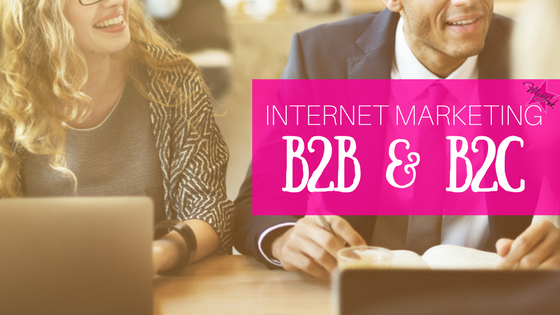Whether you are a Business to Business (B2B) company or one that is Business to Consumer (B2C), your overall objective when using online marketing will be roughly the same: to market and sell a product or service to either another business or direct to consumer. However, the methods and avenues to achieve this objective will not be the same. As evidenced in this infographic from
WSU Online, B2B and B2C marketers should have different strategies when developing an online approach to showcasing a product.
B2B/B2C Differences in Sales Cycles
Generally speaking, most B2B businesses should be using online avenues to work toward the goal of increasing lead generation through establishing long-term relationships. [ctt_hbox link=”AM2Ef” ]B2B customers are less likely to be driven by emotions when making purchases,[/ctt_hbox] and the sales life cycle is often much longer than it is with a B2C product. This drives the need for a well-established, ongoing relationship between businesses.
Many B2C companies can market successfully by reaching a wider audience that may be interested in a quick and simple product purchase. Customers in this sales cycle are more likely to make purchases based on emotional impulses, and are easier to reach through online marketing efforts that are entertaining.
When establishing an online marketing strategy for your company, there are three main ways that B2B and B2C business owners and marketers should approach online marketing in a different way.
1. B2Bs Should Focus on More Informative Industry Content
B2B marketers should be focused on creating content that will inform and inspire potential clients. This content can be shared in the form of blog posts or videos that offer insights and valuable information that will place a company at a high level of respect and authority within an industry.[ctt_hbox link=”G46U6″ ]Content created for a B2B audience should be industry-driven and specific.[/ctt_hbox] Business leaders are savvy professionals who are generally not swayed by gimmicks. The goal should be positioning a company and/or CEO as a thought leader in his/her respective industry.
In B2C marketing, oftentimes it is the most entertaining or viral content that gets the most attention and reaches a wider audience. B2C marketers can utilize entertaining marketing avenues such as colorful photos, video clips, humor, and catchy phrases, or Tweets to engage with potential customers. Many times these companies are focused more on reaching a wide audience of potential buyers as opposed to an industry-specific one.
2. Social Media Platforms: Facebook vs. LinkedIn
[ctt_hbox link=”5XN0k” ]B2B and B2C marketers should be focused on different social media platforms when considering an online strategy. [/ctt_hbox]Understanding that the goal in B2C marketing is to reach a wide audience with the product you are selling, a platform such as Facebook may be more beneficial. Through Facebook ads and boosted posts, businesses can reach thousands of people beyond their current followers. Ads can be very targeted to specific customer patterns and traits, and as long as the ad is designed well, the potential to reach new people and increase sales is almost limitless.
B2B businesses should be more focused on creating content on a site like LinkedIn. Many business people use this site as a place to network and establish connections with other business professionals. LinkedIn makes it easy for company leaders and businesses to publish content that is relative to their industry or network. LinkedIn is a great place to boost lead generation by branding your company to other business professionals.
3. Differences in Public Relations Strategy
For many B2B businesses, the role of traditional PR is not as important. While these types of businesses should still focus on publishing articles and mentions in trade magazines and publications, the focus should be on a very targeted media approach. Any publicity does not always mean good things for businesses, and they should be very selective about how they approach a media and PR strategy online. Regular media surveillance of industry-related outlets should be a top priority.
B2C companies often use a more blanketed PR approach where any mention is good to get the brand name out to consumers. Mentions in online articles and through influencers’ social media accounts can be big wins for B2C companies that want to reach consumers all around the world. These companies should still have a very targeted approach as to what type of media is best for bringing in sales, but the method to approach PR, and the types of publications pursued should be broader in scope to reach a bigger audience of potential customers.
Both types of businesses want to make sales, which is the end goal of all of these efforts. There are simply different approaches that will create online marketing success for a B2B vs. B2C company. It’s important that marketers in each type of organization have clearly defined goals, objectives, and know their target audience before implementing any new marketing strategy online.
If you are a B2B or B2C company that needs assistance with creating an online marketing strategy,
contact us at Miss Ink. With over 10 years of experience in social media and online content creation, Miss Ink can help your company establish the right online marketing strategy for your business.
References:
Five Key Differences Between B2B and B2C Online Marketing. (n.d.). Retrieved July 31, 2017, from https://www.b2bmarketing.net/en/resources/blog/five-key-differences-between-b2b-and-b2c-online-marketing
(2017, July 27). B2B vs B2C: The Different Marketing Strategies [Infographic]. Retrieved July 31, 2017, from http://www.socialmediatoday.com/marketing/b2b-vs-b2c-different-marketing-strategies-infographic?utm_source=Sailthru&utm_medium=email&utm_campaign=Issue%3A 2017-07-27 Social Media Today Newsletter %5Bissue%3A11333%5D&utm_term=Social Media Today
Taylor, J. (n.d.). B2B and B2C Marketing. Retrieved August 16, 2017, from http://onlinemba.wsu.edu/resources/mba/infographics/b2b-and-b2c-marketing/


